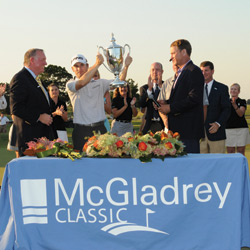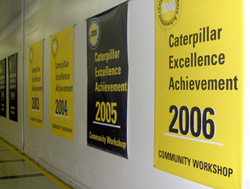Sports event sponsorships offer a way for companies to stand out in a crowd of competitors.
Today more than ever, creative marketing is an essential tool. One approach that has shown results is corporate sponsorships. By sponsoring sporting events, companies can connect with current and prospective clients, build their brands, and increase community involvement—all avenues that can lead to new and sustained business.
With so much potential for landing new business, choosing the right events to sponsor is paramount. McGladrey, the fifth-largest U.S. provider of assurance, tax and consulting services, got involved with the PGA Tour after doing some due diligence. “We decided on a national golf platform because the sport is one that we know many of our clients and potential clients enjoy watching and playing. It really plays well to our target demographic and provides us a great avenue to increase awareness for our brand,” said Ricki Lasky, senior director of sports marketing for RSM McGladrey, Inc. “The Tour prides itself, and golf, in effect, prides itself on integrity—that’s the pillar we stand upon, so it was a good fit for us.”
Likewise, Caterpillar Inc. got involved with NASCAR because studies had shown that if the company’s customers weren’t at the racetrack, they were watching races on TV. An associate sponsor since 1993, the company upped its game in 1997, becoming a full-time sponsor. It currently sponsors Jeff Burton’s No. 31 car. Greg Towles, NASCAR program director for Caterpillar, said that many of its customers identify with NASCAR racing, as both fields are very competitive and require solid teamwork and continuous improvement in a quest for excellence.
And Caterpillar’s partnership with NASCAR goes a step further than simply reaching its target demographic. “It gives us an opportunity to demonstrate our brand in action,” noted Towles. “When the customers come to the racetrack, they’ll see Cat generators, and they’ll see that Cat equipment was used to dig up and renovate these racetracks.”
Todd Fischer, manager of national sponsorships for State Farm Insurance, reported that his company partners with the NBA, NHL and Major League Baseball, targeting a different audience with each. “We use our MLB sponsorship to really drive relevance and consideration with the young family,” he explained. “Meanwhile, we use the NBA to connect with a more youthful, cross-cultural, young adult market. For us, it’s an opportunity to deliver our brand in a unique way to consumers, and a way to connect with them in places they’re passionate about.”
 Enhancing the Connection
Enhancing the Connection
Companies must be able to build and sustain special relationships with their clients, and sponsored events provide an ideal means of doing so. Lasky noted that McGladrey does not distribute information about its services at the McGladrey Classic; instead, the event is a way to get to know spectators and show major clients some hospitality. “There’s no hard sell there,” she said. “It’s more about relationship building and allowing our clients and potential clients to get to know us and what we do.”
Relationship building is also at the center of Caterpillar’s racing program. The company allows its dealers to invite customers to pre-race hospitality events, giving salespeople an opportunity to spend quality time with customers, learn about their problems and get a feel for their future equipment purchases. “[They] find that it’s a really good opportunity to spend time with customers in a more relaxed atmosphere, doing something they want to do,” added Towles.
And enhancing that connection to customers is perhaps the key element that can make sponsorships worth the time and money invested in them. Fischer noted that because the insurance industry is so competitive, it’s imperative that State Farm finds a way to stand out and make genuine connections with consumers. At its sponsored events, the company promotes its “Good Neighbor” mantra and partners with charities like the Boys and Girls Clubs of America, emphasizing that not only does it care about its customers, it also cares about the communities in which they live.
For a number of years, McGladrey has teamed up with the Special Olympics on its PGA of America sponsorship. Because the nonprofit already had a robust golf program, the partnership has been a good fit. And so it was important to McGladrey to keep the relationship active when it transitioned to the McGladrey Classic last year. Benefiting both the Special Olympics and the Boys and Girls Clubs of Southeast Georgia, last year’s Classic returned $150,000 back to the community. “We’re certainly looking forward to upping that for this year,” said Lasky.
Creating a Win-Win Experience
Craig Bertrand, general manager of Prairie Farms’ Peoria Division, said his company has been a corporate sponsor of the IHSA Boys Basketball Tournament, also known as “March Madness,” since it came to town in 1996. But several years ago, one of the title sponsors stepped down, and Peoria was in danger of losing the tournament altogether. Bertrand was asked to consider whether Prairie Farms might step into that vacated title sponsor role.
After thinking it over, he decided it’s what was best for the community as a whole. “It’s a good corporate thing to do,” he said. Prairie Farms’ involvement in March Madness proved its commitment to the community, which could, in turn, engender goodwill among potential consumers. “In the future, [they] may feel that what we did was the right thing,” added Bertrand, “and maybe they’ll choose [our product] over somebody else’s.”
Likewise, State Farm uses its sponsorships to create a positive brand experience. Most consumers interact with the agency just once or twice each year—when making premium payments. “So we use sponsorships and event marketing to create brand experiences so that [consumers] can have positive impressions of State Farm in non-insurance moments,” said Fischer. That helps the company remain top-of-mind and in a favorable light when consumers are making purchase decisions.
Maui Jim is a corporate sponsor of the Roger Rasheed Sporting Fund, a nonprofit organization founded by the international tennis coach, which gives sporting opportunities to disadvantaged children. Extremely grateful for their support, Rasheed said of the sunglass maker: “They are innovative and love the outdoors and supporting an active lifestyle which revolves around fun and a positive way of life. They want to see children engage in positive activity and experience a quality of life, and you can see that in the way they deliver their brilliant brand across the globe. So when I spoke with Linda Glassel, vice president of marketing for Maui Jim, we automatically saw a great fit.”
These types of partnerships with nonprofits are a win-win for both organizations. “If you can forge great partnerships and relationships out there,” added Glassel, “it’s a great way to build brand awareness and also be involved in your community.”
Caterpillar’s brand awareness receives a substantial boost through its trade-outs with racetracks. In exchange for providing generators and light towers at a Fontana, California, track, the company was given a large billboard at turn two. Each time the cars went around the turn, its logo and website received national television coverage.
Caterpillar also gains recognition each time Jeff Burton’s car is seen on television. Joyce Julius, an independent research firm out of Michigan, measures the amount of TV exposure companies gain from sponsored cars during races and compares it to the cost of airing advertisements during the same broadcast. According to the firm’s reports, Caterpillar received $100 million worth of TV exposure from its car sponsorship last year alone.
 Sponsorships Pay Off
Sponsorships Pay Off
When it comes down to it, no company, big or small, is going to continue investing in a sponsorship that isn’t paying off. Caterpillar has a Six Sigma program that measures the return on its NASCAR sponsorship, and according to Towles, it has always shown favorable results. “The reason it’s been able to last this long is because we do measure it,” he said. “We’ve been able to demonstrate that it really adds true value to Caterpillar.”
For most companies, corporate sponsorships are rarely about just making a sale, but they do offer exposure for the sponsors’ products. Speaking about the Maka Maka Run, a Maui Jim-sponsored benefit for Peoria’s Friendship House, Glassel said, “I don’t care as much about the banners that are hung at the finish line. What I care about is that people are coming to our booth, touching the product, feeling it, putting it on, and seeing the difference when they actually touch the product.”
Likewise, McGladrey has been pleased with its first-year sponsorship of the McGladrey Classic. “We want to ensure that people know who we are,” said Lasky. “It’s about brand awareness for us, it’s about business building, and it’s about giving back.” iBi


